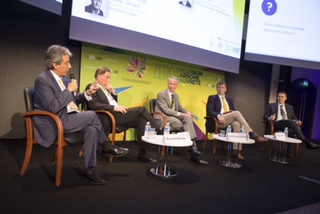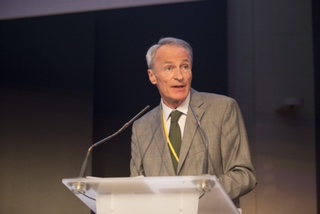Michelin CEO Calls for Support to the Lima Paris Action Agenda Process to Foster Sustainable Transport
The President and Chief Executive Officer of Michelin, Jean-Dominique Senard, delivered a speech at the Convergences World Forum 2015 to highlight the role of the Lima Paris Action Agenda (LPAA) in enhancing innovation and cooperation for various stakeholders in sustainable transport.
 The Michelin CEO spoke yesterday at a panel session with Manuel Pulgar-Vidal, Minister of Environment of Peru, Janos Pasztor, United Nations Assistant Secretary-General on Climate Change, and Nigel Topping, Executive Director of CDP.
The Michelin CEO spoke yesterday at a panel session with Manuel Pulgar-Vidal, Minister of Environment of Peru, Janos Pasztor, United Nations Assistant Secretary-General on Climate Change, and Nigel Topping, Executive Director of CDP.
Senard began his speech by emphasizing that we share a huge responsibility to enable development, health, peace and a people-friendly environment. Zero exclusion, zero carbon, and zero poverty are the three major pillars to drive the world in a sustainable and lasting direction. These three pillars echoes with Michelin’s principle to provide “mobility for all, at the best price, in the safest conditions.”
Senard pointed out that transport “is an underlying common thread for the success” for the 17 Sustainable Development Goals (SDGs) and that three conditions must be met to develop responsible quality growth:
- Transport energy intensity and negative externalities must be drastically reduced
- Seamless inter-modality (including soft mobility) must become a reality
- Supply and production chains must be shortened and re-designed

He praised the Lima Paris Action Agenda (LPAA) as a “brilliant, greatly innovative initiative” and welcomed the mandate of the Paris Process on Mobility and Climate (PPMC) a Michelin Challenge Bibendum – SLoCaT partnership to enhance activities to promote sustainable transport during COP21.
Under the LPAA, a number of ambitious initiatives have been launched:
- Adaptation plans for harbors and waterborne infrastructures
- Global aviation sector commitment to cut emissions by 50% by mid-century
- Global advocacy of reducing passenger car energy consumption by 50% by 2050
- International railway association aiming to reduce specific average CO2 emissions from train operations by 75% by 2050, relative to a 1990 baseline
- Global public transport sector standing for doubling its market share by 2025
- Global clean urban bus initiative launched by C40 for 2020.
Another objective of the LPAA is to inspire other initiatives to broaden the scope of action and achieve as comprehensive as possible a coverage of the transport sector emissions.
Senard concluded by reassuring Michelin’s commitment to contribute to a Global Agreement on Climate Change that empowers the transport sector – with the unmitigated support from State and non-State stakeholders – to take visible action on climate change and the transformation of mobility, and assume a leadership role in innovative societal responsibility.
For the full text of the speech, please go to here.